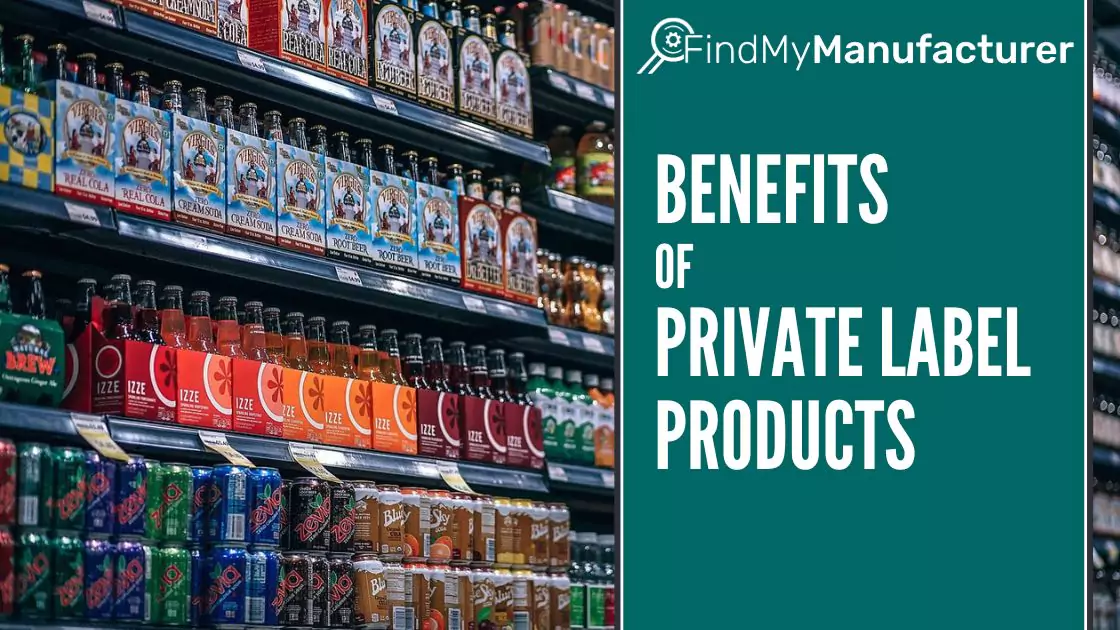If you are looking for a straightforward and effective way to expand your product line, Private label products may be the way to go. A private label product is manufactured by one company and sold under another company’s brand. In other words, you can customize products from a private label manufacturer, put your brand on them, and sell them as your own.
Over the last decade, there has been a growing trend of major brands and retailers having their private-label products. There’s a good reason why this trend continues to dominate retail. It is a low-cost, low-risk way to expand your brand without spending months or years of product development.
Private Label products empower retailers and brands to fill the gaps in their product lines easily. It allows companies to design and order targeted products that best suit their customers. Big brands often do not care about addressing the needs of a specific demographic. Instead, they specialize in creating a successful product targeted to as wide an audience as possible.
There are many benefits of private label products, which is why more and more businesses are turning to them. Here are 10 benefits of private label products that you should know about:
1. You Can Get Your Products to Market Quicker
A key advantage of private-label products lies in the expedited time-to-market they offer. This is attributed to the well-established experience and efficient infrastructure of private label manufacturers, enabling them to produce products swiftly and effectively. Consequently, this translates to a faster market entry for your products, leading to quicker results. This swiftness can prove highly advantageous for companies aiming to enter new markets promptly or swiftly respond to shifts in their existing markets. Additionally, it serves as a significant benefit for small companies or startups, lacking the resources for extensive product development and marketing, allowing them to bring their products to market expeditiously.
2. You Can Reduce The Risk

Embarking on a new product development journey involves significant time and financial commitments, coupled with uncertainties about the product’s success. The inherent risks in product design can be daunting, but for many retailers, there exists a promising opportunity to disrupt their markets. Retailers selling privately labeled products can sidestep much of the traditional risks associated with product design. By controlling the product’s sales strategy, they gain exposure and secure a client base tailored to their specific customer profiles, mitigating uncertainties.
Moreover, the process is made more manageable as reputable manufacturers are often willing to produce a test batch for retailers to gauge customer response. Collaborative efforts between the retailer and the manufacturer allow for adjustments and refinements, ensuring the final product aligns seamlessly with customer preferences. As a retailer identifies its niche and refines the product accordingly, the prospect of placing larger orders not only facilitates cost savings but also enables efficient inventory management. In essence, the private label approach offers retailers a more calculated and customer-centric route to product development, minimizing risks while maximizing market potential.
3. Scale Your Business Faster
In the current competitive business landscape, maintaining market share has become increasingly challenging for companies. In this scenario, private-label products emerge as a valuable asset for businesses, offering numerous advantages. Among these benefits, the most crucial is the facilitation of rapid and streamlined business scalability.
When a company produces its own goods, considerable efforts are expended in marketing, research and development, and manufacturing. In contrast, leveraging private label products allows the company to channel its focus predominantly towards marketing and sales, as the manufacturing process is already handled externally. This strategic shift not only optimizes the allocation of resources but also results in significant time and cost savings. The freed-up resources can then be directed towards other essential aspects of business operations, enhancing overall efficiency and competitiveness.
4. Offer Better Variety to Your Customers
Embracing a private label brand provides businesses with the distinct advantage of offering better variety to their customers. By exercising control over the product development process, companies can tailor their private label offerings to cater specifically to the preferences and demands of their target audience. This ability to curate a unique and diverse range of products enhances the overall shopping experience for customers, fostering brand loyalty. Unlike relying solely on established brands, a private label allows businesses to introduce innovative and exclusive items, setting them apart from competitors and establishing a stronger connection with their consumer base. Ultimately, the freedom to shape a distinct product assortment enables businesses to meet the diverse needs of their customers, contributing to increased customer satisfaction and sustained success in the market.
Read our recent blog: Key Considerations When Choosing a Private Label Manufacturer
5. You Can Control The Pricing

Embracing a private label brand is associated with numerous private labeling benefits, and a notable aspect among these private label benefits is the valuable advantage of controlling pricing. This control over pricing is a pivotal element in shaping the market positioning and competitiveness of businesses. In stark contrast to retailing national brands where prices are often dictated by external factors, private label products empower companies to determine their pricing strategy. This autonomy bestows upon businesses the ability to align prices precisely with the preferences of their target market, providing a significant competitive edge and fostering customer loyalty. With this control over pricing, businesses can strategically position their products in the market, whether as affordable alternatives or premium choices, by their brand positioning and target audience. This flexibility not only facilitates a more responsive approach to market dynamics but also presents the opportunity to optimize profit margins and adapt to changing economic conditions, thereby underscoring the private label benefits and contributing to the overall financial health and sustainability of the business.
6) Consumer Cost Savings
The adoption of a private label brand brings forth a notable benefit for consumers in the form of cost savings. Private label products, being exclusive to the retailer, often come with lower price points compared to national brands. The absence of intermediary layers and marketing expenses associated with well-known brands allows retailers to pass on these cost efficiencies directly to consumers. This affordability proves especially advantageous for budget-conscious shoppers, providing them with quality alternatives at more accessible price levels. As private label brands continue to emphasize value without compromising on product quality, consumers benefit from the opportunity to make economically sound choices without sacrificing the reliability and standards they seek in their purchases. Ultimately, the consumer cost savings associated with private label brands contribute to a more budget-friendly and appealing shopping experience.
7) Less Competition
One of the noteworthy advantages of private labeling, particularly for small businesses, is the potential for reduced competition in the market—a key aspect highlighting the advantages of private labeling for small businesses. In contrast to national brands embroiled in intense competition and price wars on store shelves, private label products, exclusive to a particular retailer, navigate a less crowded space. This exclusivity allows small businesses to carve out a unique niche for their products, offering a respite from direct competition with other brands. Small businesses can precisely tailor their private label offerings to cater to specific customer preferences, thereby creating a distinctive selling proposition that sets them apart in the marketplace. With reduced competition, small businesses can not only establish stronger brand loyalty but also capture a dedicated customer base, fostering long-term relationships—an achievement that proves especially advantageous in markets saturated with numerous competing brands, emphasizing the advantages of private labeling for small businesses.
8) Product Exclusivity
Private label products offer consumers a unique allure, accentuated by the sense of exclusivity that distinguishes them from mainstream options – a key aspect underlining the pros of private label products. This exclusivity stems from the meticulous craftsmanship and exclusive availability of these products through a specific retailer. Beyond satiating the consumer’s desire for distinctiveness, this inherent exclusivity also reinforces the retailer’s brand identity. Shoppers are captivated by the prospect of acquiring products unattainable elsewhere, cultivating a sense of privilege and uniqueness in each purchase. This exclusivity serves as a potent marketing tool, particularly enticing consumers seeking a more personalized and individualized shopping experience. The appeal of exclusive offerings contributes to the cultivation of a loyal customer base, showcasing the pros of private label products as a means of establishing and solidifying a retailer’s unique market position.
9) Retailer Independence
The strategic advantage of tailoring private label products to cater to specific niche markets is a cornerstone of the numerous private label product benefits for businesses. This level of customization empowers companies to meticulously refine their offerings, ensuring a seamless alignment with the unique needs and preferences of specialized customer segments. By discerning the distinct requirements of these niche markets, businesses can craft private label products that resonate precisely with consumer expectations, fostering a profound connection with their target audience. This personalized approach not only elevates customer satisfaction but also solidifies the business’s position as a specialized and dependable source within the niche. Consequently, this strategic maneuver enables businesses to capture the loyalty of these specialized customer segments, providing a distinct competitive edge in markets that may be overlooked by larger, more generalized brands, showcasing the far-reaching private label product benefits.
10) Opportunity for Collaboration
The collaboration between retailers and private label manufacturers goes beyond a transactional relationship, evolving into a dynamic partnership that contributes to continuous improvement, innovation, and long-term success. By working closely with manufacturers, retailers can share insights into market trends, customer preferences, and emerging demands, enabling a responsive and adaptive approach to product development. This collaboration fosters a culture of innovation, where retailers and manufacturers brainstorm and experiment with new ideas, ensuring that private label products remain fresh, relevant, and aligned with evolving consumer needs. The symbiotic relationship allows for seamless communication and feedback loops, facilitating continuous improvement in product quality and performance. As a result, retailers can build resilient, customer-centric product lines that stand the test of time, fostering a successful and enduring partnership between the retailer and the private label manufacturer.
Conclusion
In conclusion, the benefits of private label products are manifold and position them as a strategic asset for businesses navigating the complexities of the competitive market landscape. From offering enhanced brand differentiation and control over pricing to fostering consumer cost savings, private label brands empower businesses with the tools to tailor their product offerings to specific niches and build lasting connections with their customers. The ability to swiftly adapt to market changes, capitalize on continuous innovation through collaborations and secure a sense of exclusivity further solidify the value of private label products. As businesses embrace the flexibility, agility, and customization opportunities that come with private label branding, they not only navigate the challenges of the market effectively but also set the stage for long-term success and resilience in an ever-evolving business environment.
In today’s business landscape, retailers and brands are leveraging platforms like Find My Manufacturer to seamlessly connect with top private label manufacturers, turning their strategic visions into tangible realities. These platforms serve as invaluable bridges, facilitating efficient collaboration between brands and manufacturers by streamlining the sourcing and vetting process. Through such platforms, businesses can explore a diverse array of private label manufacturers, assess their capabilities, and establish partnerships that align with their unique requirements. This approach not only enhances the accessibility of reliable manufacturing partners but also expedites the process of transforming conceptual strategies into tangible, market-ready products. As a result, Find My Manufacturer and similar platforms play a pivotal role in catalyzing innovation, accelerating time-to-market, and ultimately contributing to the overall success of retailers and brands in the competitive marketplace.
Frequently Asked Questions
How to find private-label products?
There are a few different ways that you can find private-label products. One way is to search for them online. You can also look for the in-store or ask store employees if they know of any private-label products. Another way to find private-label products is to contact manufacturers directly and ask if they offer any private-label products.
Can I sell private-label products on amazon?
Yes, you can sell private-label products on Amazon. You will need to create a seller account and list your products for sale. Amazon will then handle the sale and shipment of your products.
How much does it cost to private-label a product?
The cost of private labeling a product will vary depending on the type of product, the quantity ordered, and the quality of the finished product.
